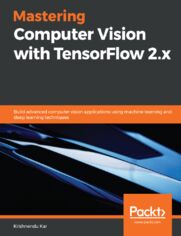Mastering Computer Vision with TensorFlow 2.x - Helion

Tytuł oryginału: Mastering Computer Vision with TensorFlow 2.x
ISBN: 9781838826932
stron: 419, Format: ebook
Data wydania: 2020-05-15
Ksi─Ögarnia: Helion
Cena ksi─ů┼╝ki: 125,10 z┼é (poprzednio: 139,00 z┼é)
Oszczędzasz: 10% (-13,90 zł)
Apply neural network architectures to build state-of-the-art computer vision applications using the Python programming language
Key Features
- Gain a fundamental understanding of advanced computer vision and neural network models in use today
- Cover tasks such as low-level vision, image classification, and object detection
- Develop deep learning models on cloud platforms and optimize them using TensorFlow Lite and the OpenVINO toolkit
Book Description
Computer vision allows machines to gain human-level understanding to visualize, process, and analyze images and videos. This book focuses on using TensorFlow to help you learn advanced computer vision tasks such as image acquisition, processing, and analysis. You'll start with the key principles of computer vision and deep learning to build a solid foundation, before covering neural network architectures and understanding how they work rather than using them as a black box. Next, you'll explore architectures such as VGG, ResNet, Inception, R-CNN, SSD, YOLO, and MobileNet. As you advance, you'll learn to use visual search methods using transfer learning. You'll also cover advanced computer vision concepts such as semantic segmentation, image inpainting with GAN's, object tracking, video segmentation, and action recognition. Later, the book focuses on how machine learning and deep learning concepts can be used to perform tasks such as edge detection and face recognition. You'll then discover how to develop powerful neural network models on your PC and on various cloud platforms. Finally, you'll learn to perform model optimization methods to deploy models on edge devices for real-time inference. By the end of this book, you'll have a solid understanding of computer vision and be able to confidently develop models to automate tasks.
What you will learn
- Explore methods of feature extraction and image retrieval and visualize different layers of the neural network model
- Use TensorFlow for various visual search methods for real-world scenarios
- Build neural networks or adjust parameters to optimize the performance of models
- Understand TensorFlow DeepLab to perform semantic segmentation on images and DCGAN for image inpainting
- Evaluate your model and optimize and integrate it into your application to operate at scale
- Get up to speed with techniques for performing manual and automated image annotation
Who this book is for
This book is for computer vision professionals, image processing professionals, machine learning engineers and AI developers who have some knowledge of machine learning and deep learning and want to build expert-level computer vision applications. In addition to familiarity with TensorFlow, Python knowledge will be required to get started with this book.
Osoby które kupowały "Mastering Computer Vision with TensorFlow 2.x", wybierały także:
- Japoński cyberpunk. Od awangardowych transgresji do kina popularnego 34,53 zł, (26,59 zł -23%)
- ZSRR si─Ö ┼Ťmieje. Filmy Leonida Gajdaja i radziecka kinematografia komediowa 21,12 z┼é, (17,53 z┼é -17%)
- Prawo medi 68,18 zł, (57,27 zł -16%)
- Japoński cyberpunk. Od awangardowych transgresji do kina popularnego 15,18 zł, (12,75 zł -16%)
- W┼éadza na dywaniku. Jak polskie media rozliczaj─ů polityk├│w? 30,68 z┼é, (25,77 z┼é -16%)
Spis tre┼Ťci
Mastering Computer Vision with TensorFlow 2.x. Build advanced computer vision applications using machine learning and deep learning techniques eBook -- spis tre┼Ťci
- 1. Computer Vision and Tensorflow Fundamentals
- 2. Content Recognition using Local Binary Pattern
- 3. Face Recognition and Tracking using Viola Jones Algorithm & OpenCV
- 4. Deep learning on images
- 5. Neural Network Architecture & Models
- 6. Visual Search using Transfer Learning
- 7. Object Detection using YOLO
- 8. Semantic Segmentation and Neural Style Transfer
- 9. Action Recognition using Multitask Deep Learning
- 10. Object Classification and Detection using RCNN
- 11. Deep Learning on Edge Devices with GPU/CPU Optimization
- 12. Cloud Computing Platform for Computer Vision




